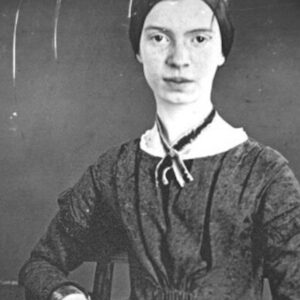“The poet disappears into the poem, which stands mute, like an idol, until the reader breathes life back into it. And only then does it shimmer again with imaginative presence.” — Edward Hirsch, How to Read a Poem
Reading poetry is not like reading fiction. A good novel pulls me onward, makes me turn its pages, wondering what the protagonist will do next. A good poem does the opposite: makes me pause, draws me into itself and holds me there.
For this post, I want to choose a poem and write out how it draws me in. I’m standing here before my poetry bookshelves. So many enticing options: Richard Wilbur, W. S. Merwin, Pattiann Rogers…. But my hand reaches for Jeanine Hathaway’s latest collection, Long after Lauds. I’ve read through these poems more than once, for a review that I wrote. But today I want to read not “through” the poems but “into” just one of them.
I leaf slowly through the pages. Lots of the poems call me to come in—like playmates calling to a child from their porches. Finally, I decide to answer the call of “Inexpressibly.”
Whenever I read a poem to enter deeply into its world, I take a small square of paper and cover all the lines below the one I’m engaging with. This is my way of making sure I stay with one line at a time and don’t peek ahead. So I put my paper under the poem’s first line:
Of course that’s how silence reveals itself.
With that “of course that’s how,” I’m entering into the middle of a discourse. What came before? Well, the poem’s title. So: how does “silence reveal itself”? “Inexpressibly.” As I step into the poem, I step right into this paradox—for can a “revealing” be “inexpressible”?
I slip my paper down beneath the second line:
I want to hear it but there’s the beep
The speaker is trying to do something that’s possibly impossible: to “hear” silence. Keeping her from doing this is a sound: a “beep”—
of a forklift in reverse; there’s the ringing
More sounds obstruct the goal of hearing silence: that backing-up beep that trucks are required to have (and I remember vaguely when this was decreed… decades ago—after, I recall, a child was run over by a truck moving in reverse). And what’s this “ringing”? I slip my paper down to discover that it’s not a bell or an alarm, but
in my ears. A bug crashes against my
“Crashes” evokes a sudden super-loud sound—though how much noise could a “bug” make?
daughter’s high frequency curls.
“High frequency”: so high that we can’t hear it? Or the high-pitched silent sound of mother-daughter tension?—over that curly hair? I leave the questions hanging in the air and slip down to
Refrigerated food breaks down despite the cold
—which makes me smile. Because the search for silence seems to have been abandoned, given way to the fridge. But maybe not: the breakdown of food would occur without a sound. Let’s see if silence will prevail:
and there’s the deafening deconstruction
Nope. This breakdown, this deconstruction (of what we don’t yet know), is “deafening.” And now here’s a stanza break, which always calls for an extra pause. Though with the undefined “deconstruction” left hanging, I don’t wait long before moving my paper under the next stanza’s first line:
of this make-do bookmark, this postcard written
That postcard as bookmark makes me smile again—at the image of its deconstruction being “deafening.” Then I’m left hanging again, by the “postcard written.” (Playful line-breaks like these always make my entering into a poem great fun—like playing a guessing game, like Twenty Questions or Bleep.)
by my mother days before she died. In church
Is it her mother’s death that brings the speaker into “church”?
the interpreter wears solid colors, a curtain
Ah, someone at church is truly deaf. Truly “hears” only silence. But what’s that curtain? I’d expect to see a curtain on a stage, not in a sanctuary. (Again the line-break raises a question that lures me down to the next line):
behind her hands’ deft evocation of God
So the “curtain” must be the interpreter’s solid-colored clothes.
whose beguiling privacy unsettles
God’s beguiling privacy? That holds me in an extra-long pause. God’s “privacy” is unnerving. What happened to our God who communicates with us constantly? And “beguiling”? The speaker’s God is apparently deceptive. This is “unsettling”—
the heart, the “lub” addressing its twin,
That “heart” at first seems spiritual, synonymous with “soul” (connected to “God” as it is). But its “lub” brings it immediately into the material realm: lub-dub is how a beating heart’s sound is described, as it pulses from chamber to chamber.
Then comes the poem’s final stanza break, with that comma swirling me down to the final stanza’s first line—
the other side of the river
Whoa! How did we get from the lubbing heart to a river? Maybe in that tiny comma after “twin,” suggesting by apposition that the river’s “other side” is the heart’s lub‘s twin—so that the river might be a metaphor for the heart—
where women wash work clothes, the shift-change
—but if it’s a metaphor, we’re now moving fully into it, watching the women. And that “shift-change”? I hold onto it as I slip down into
siren of sweat released into larger bodies
I laugh delightedly at the games the poet is playing here. A “shift-change / siren” is the (loud) sound in a factory indicating a change of work-shifts. But here it’s a “siren of sweat”: no sound at all. And these “larger bodies”: are they the bodies of oversized women washing the clothes? Let’s see:
of water, where a sister’s hand will slap
Again the poet’s line-break has teased us. The “bodies” turn out to be “of water.” And what does the sister’s hand slap? I slip my paper down beneath what is the poem’s final line:
the surface, introduce rhythm by skipping a beat.
Slapping the water’s surface could certainly introduce a rhythm—of tiny waves. But “skipping a beat” returns us to the beating of the heart—which returns us to a sound. Yet… this final sound isn’t a sound at all, for the heart’s beat has been “skipped.” Have we circled back to the poem’s beginning, answering its question: Of course that’s how silence reveals itself?
So, where has entering into this poem brought me? Through delightful metaphor-shifts and teasing line-breaks that keep my mind actively moving among images—images for the sounds that drown out the silence I’m searching for. Which makes me wonder: does this sound of my own mind’s churning prevent my experiencing silence? Or is this “sound” a form of silence: a basic condition of attentiveness?
I like when entering into a poem leads me into questions. I don’t read a poem for answers; for answers, I go to wikipedia. I read a poem to be brought into a new experience—even if (or maybe especially when) I’m brought there “inexpressibly.”
Peggy Rosenthal has a PhD in English Literature. Her first published book was Words and Values, a close reading of popular language. Since then she has published widely on the spirituality of poetry, in periodicals such as America, The Christian Century, and Image, and in books that can be found here.





